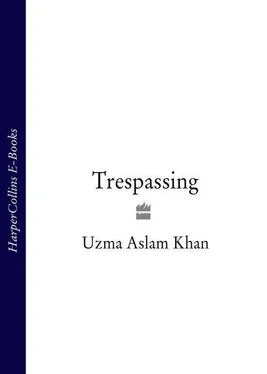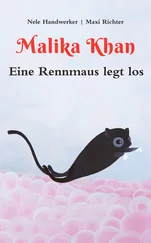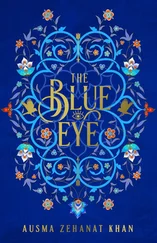Sumbul would say he was like his father in this respect too. ‘Aba spends all day glued to the television, imagining he’s Dilip Kumar. Who do you think you are?’
He never told her that if anyone had got him on to love-songs, it was Fatah.
He didn’t ache for him as much now. He could remember, without longing, a tender Fatah in the grass, nuzzling his neck, piping, ‘White, white is your body, made of electricity. 440 volts!’
‘But I’m black as tar,’ Salaamat would say.
‘Silly, close your eyes. We can pretend, can’t we?’
He didn’t want that any more. He belonged to no one.
On the charpoy, Salaamat turned up the volume of the song when Khurram’s old chawkidaar shuffled into his room. ‘There’s a woman asking for you at the gate,’ he said.
‘What sort of woman?’ Salaamat sat up.
‘How should I know?’ The man went back to his work.
At the gate stood a short and rather dowdy woman, clad in rubber slippers. The only thing going for her was a very fair complexion. He recognized her immediately: the Amreekan’s mother. She sometimes walked past them to throw litter in the empty plot. Once, while rummaging through a pile she’d left, he’d found the most enticing pictures imaginable, such as the one of the blonde woman in a skintight sleeveless top, with breasts like cones. Oh yes, she’d prance for him and sing, Open yourself to me. There was another with bare legs, sitting on the Amreekan’s lap. Salaamat had kept them all. The next time the video shopkeeper threw him out after he’d seen only one dance number, Salaamat had shown him a photograph. He’d been allowed to stay till the end of the film. On the next visit, he’d shown more. By now the shopkeeper and his friends had seen the pictures at least a dozen times but the bribe still worked.
When she saw him, the woman cleared her throat. Then she seemed astounded by her own audacity, and for several seconds, stood speechless. Finally, ‘Is my son here?’
‘No.’
Now she was astounded by his audacity. Well, he wasn’t going to address her by a title just because she expected it. The only man he called sahib was Khurram’s father and the only woman who was begum sahib to him was Khurram’s mother.
She cleared her throat again. ‘Well, it seems he’d been coming here a lot and you’d been taking him somewhere. Is this correct?’
‘Yes.’
‘Where?’
Salaamat leaned into the tall gate. It was happening again: he was being sucked into another world. Didn’t they all see how trivial it was? He chewed the inside of his cheeks.
Suddenly, she handed him fifty rupees. ‘Please tell me.’
He took it. ‘To a beach, far away.’
She nodded, as if expecting this. Then: ‘With whom?’
Again he chewed his cheeks. She came out with another fifty. ‘With the Mansoor child, Dia.’
She sighed but he saw she wasn’t surprised about this either. ‘And have they gone there again?’
He shook his head.
‘Do you know where they are?’
Of course he did. He often saw the girl getting dropped at his end of the street, then walking down to the teahouse. She chose this side so she’d not be seen walking past the Amreekan’s house. It was a silly plan, made by a silly girl, to get together with a silly boy. He frowned. She repeated the question, this time with twice the money.
He shrugged. ‘Yes, I know.’
‘We can take a taxi,’ she pleaded.
Maybe saving Dia from further disgrace would have been Mr Mansoor’s own last wish. Who could say? Sumbul had wanted him to talk to the girl’s mother. Now here was the boy’s mother.
He shrugged again. ‘We don’t need a taxi.’
Riffat Mansoor walked briskly, as always. Leaning over the trays of caterpillars she exchanged a few words with her employees, examined the mulberry stock, drafted notes on her clipboard, and exhaled so vigorously the curls on her forehead fluttered like down feathers. She was exhausted. Every few weeks a team of men arrived with a long list of reasons why they needed to be paid. Otherwise, they threatened to burn her farm, or simply cut off the water supply. She was tired of ringing her lawyer, who’d increased his charges. She’d been forced to hire engineers to tell her if the current water crisis had more to do with the Mafia than the drought. They said, ‘It could be,’ and sent a team of experts who complained about the heat and vanished. She’d hired someone else who sent a different set of experts. They dug around her land, shook their heads, demanded tea. If she lost her temper she was called a fool for breeding silkworms in Sindh. When reminded that she’d succeeded thus far, they waited for her to lose her temper. And this was a very small part of her day.
Another worry was that for the past few years, the trouble in the province made it hard for her workers to get to work. Transport was infrequent and unsafe. Besides, with the exception of the gardeners and guards, the staff was all women, and this meant family came first. There were days when husbands and in-laws threw tantrums or children fell ill. All this meant the caterpillars weren’t fed, and since there were as many as two hundred thousand to feed, it meant she or Dia spent the entire day chopping a ton of leaves. Once she’d even asked an armed guard to pitch in, and had had to laugh when he said it would get his Kalashnikov dirty. ‘Set it aside,’ she’d argued, certain that no woman had ever asked him to mince anything before. He grudgingly complied, wrinkling his nose at the foliage as though it were a used nappy.
Then there was the factory. After Mansoor’s death, she’d refused to let his family take over her silk line, but this meant she’d also retained the stress of managing it. Her weavers came from Orangi Town, a neighborhood that was plumb in the center of the arson and strikes, and many had suffered tragedies in their own families. They’d say, ‘Bibi, if a rich man like your husband could be a victim of crime, what hope is there for people like us?’
To combat power breakdowns she’d finally installed a high-power generator, but every time the engine revved and black smog lifted into the air she winced. It made no sense: this use of fuel to sustain an industry she’d taken pains to start cleaning by introducing natural dyes. But it pained just as much not to use the generator when the weavers did show up and the power shut down — it was the choice between a waste of human or natural resources, even as she worked hard to prove the two were the same. But there was no arguing around it, especially when she conceded that fuel was depleted in another way too: by commuting between her house in K.D.A, the farm near Thatta, and the factory near the dead Lyari River. It was the choice between working and sitting at home. Both produced their own waste.
And somewhere in the equation lapped her children — fatherless atoms orbiting worlds increasingly hidden from her. What could she do about Hassan’s arrogance? About her older son who’d given up on his homeland? The grandchild she hardly knew? And Dia — where was she these days? She’d never known her to look so distraught, not since Mansoor’s death. Had Nissrine’s desire to marry unleashed some dread about her own future? Well, with good reason. Dia was doing miserably at college, Riffat knew, because she wasn’t being taught the things that mattered to her — entomology, zoology, mythology. She’d heard they offered degrees in just about everything now, in the new colonial power many parents were sending their children to. More even than England had offered when her generation went abroad to study.
Riffat tapped on her clipboard, unhappy with the turn her thoughts were taking. She didn’t like to think of her London days. Not because of her classes — those had enriched her. She shook her head. Her attention returned to Dia. The child didn’t want to leave home, but was it coming to that? Wouldn’t it be better to send her away than watch her feel ineffectual here? Would it?
Читать дальше
Конец ознакомительного отрывка
Купить книгу












